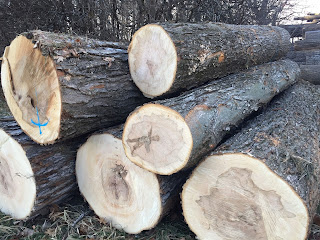ACF Forest Management Update 1/5/21
Happy Holidays, and Happy New Year!
The forest management project at the Andrews Community Forest has been in limbo for over a month, as we wait for the ground to freeze. The road improvements that we've made have helped, but unfrozen soils at this time of year are very wet and difficult to work without damaging soils. We have had short periods of dry and/or frozen soils which have allowed us to harvest some more wood (3 loads of white pine logs and 1 load of hardwood logs were shipped out just before the end of the year), but at this point we're behind schedule, and all we can do is to wait for the weather to cooperate so we can really get going.
While many loggers work all year, winter is by far the most productive time. Frozen soils make for easier skidding, and allow equipment to access wetter and more sensitive areas without causing soil compaction and root damage. While some special areas are what foresters and loggers would call "summer ground" --primarily due to well-drained soils -- and some areas can be logged when the weather has been especially dry -- like this past summer -- a lot of areas can only be managed in the winter. For most loggers, winter is like summer is for farmers -- a short, fickle time of the year when they make most of their income. Something limiting their ability to work during that short period of time can be disastrous for their business.
While we don't know exactly how climate change will express itself, we do know that our winters are likely to become warmer and wetter. This is a threat to livelihoods of our loggers, mill owners, firewood processors and foresters, and to the secondary manufacturers who make beautiful stuff out of local wood. This exact scenario is playing out this winter, with temperatures in the 60's on Christmas Eve and Christmas Day ruining nice frozen ground conditions, and daytime temperatures consistently staying above freezing.
How will we respond to this? Part of the solution will be improving our "access infrastructure," making our forestry roads and trails more resilient to the effects of climate change. Another part of it may mean doing more forest management in the summer and fall, when soils are dry, rather than in the winter when soil conditions may be unreliable. A third may be thinking about other creative ways to keep forest management viable in an uncertain future. In any case, good forest management is important enough to our ecosystems and our communities to be worth us thinking hard about how to make it happen even when conditions aren't perfect.
The weather coming up this week looks colder -- keep your fingers crossed for nice, hard frozen ground at Andrews!




Comments
Post a Comment